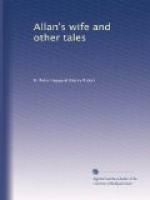To go any further was useless; we knew all about it now, so we turned to look for the other horse. But our cup of misfortune was not yet full; the horse was nowhere to be found. Terrified by the sight and smell of the lions, it had with a desperate effort also burst the reim with which it had been knee-haltered, and galloped far away. I sat down, feeling as though I could cry like a woman. For now we were left alone in these vast solitudes without a horse to carry us, and with a child who was not old enough to walk for more than a little way at a time.
Well, it was no use giving in, so with a few words we went back to our camp, where I found Tota crying because she had woke to find herself alone. Then we ate a little food and prepared to start. First we divided such articles as we must take with us into two equal parts, rejecting everything that we could possibly do without. Then, by an afterthought, we filled our water-bottles, though at the time I was rather against doing so, because of the extra weight. But Indaba-zimbi overruled me in the matter, fortunately for all three of us. I settled to look after Tota for the first march, and to give the elephant gun to Indaba-zimbi. At length all was ready, and we set out on foot. By the help of occasional lifts over rough places, Tota managed to walk up the slope of the hill-side where I had shot the Petie buck. At length we reached it, and, looking at the country beyond, I gave an exclamation of dismay. To say that it was desert would be saying too much; it was more like the Karroo in the Cape—a vast sandy waste, studded here and there with low shrubs and scattered rocks. But it was a great expanse of desolate land, stretching further than the eye could reach, and bordered far away by a line of purple hills, in the centre of which a great solitary peak soared high into the air.
“Indaba-zimbi,” I said, “we can never cross this if we take six days.”
“As you will, Macumazahn,” he answered; “but I tell you that there”—and he pointed to the peak—“there the white man lives. Turn which way you like, but if you turn you will perish.”
I reflected for a moment, Our case was, humanly speaking, almost hopeless. It mattered little which way we went. We were alone, almost without food, with no means of transport, and a child to carry. As well perish in the sandy waste as on the rolling veldt or among the trees of the hill-side. Providence alone could save us, and we must trust to Providence.
“Come on,” I said, lifting Tota on to my back, for she was already tired. “All roads lead to rest.”




